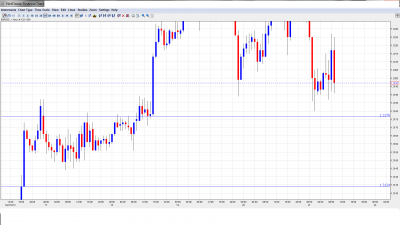EUR/USD continues to show volatility, as it fell sharply following several strong releases out of the US on Thursday. Final GDP, Existing Home Sales and the Philly Fed Manufacturing Index were all better than the market estimate. The euro dropped below the 1.32 line overnight, but has partially recovered. In Friday’s releases, GfK German Consumer Climate disappointed, falling below the market forecast. It will be a busy day in the US, with seven releases, highlighted by Core Durable Goods Orders.
EUR/USD Technical
- Asian session: Euro/dollar dropped as low as 1.3180, but bounced back late in the session, and consolidated around 1.3195. In the European session, the pair is back above 1.32.
- Current range: 1.3170 to 1.3290.
Further levels in both directions:
- Below: 1.3170, 1.3130, 1.3110, 1.3030, 1.2960, 1.2880, 1.28, 1.2750, 1.2690, 1.2624, 1.2590 and 1.25.
- Above: 1.3290, 1.34, 1.3480 and 1.36.
- 1.3170 continues to provide support, after being breached overnight.
- 1.3290 is a significant resistance line.
Euro/dollar lower after strong US data – click on the graph to enlarge.
EUR/USD Fundamentals
- 7:00 German GfK German Consumer Climate. Exp. 5.9 points. Actual 5.6 points.
- 13:30 US Core Durable Goods Orders. Exp. -0.2%.
- 13:30 US Core PCE Price Index. Exp. +0.1%.
- 13:30 US Durable Goods Orders. Exp. +0.2%.
- 13:30 US Personal Spending. Exp. +0.4%.
- 13:30 US Personal Income. Exp. +0.3%.
- 14:55 US Revised U0M Consumer Sentiment. Exp. 74.9 points.
- 14:55 US Revised U0M Inflation Expectations.
For more events and lines, see the Euro to dollar forecast
EUR/USD Sentiment
- US Data shines: The markets had a lot to smile about on Thursday, as the US produced some excellent data. Final GDP climbed 3.1%, and Existing Home Sales posted its best performance since May 2011.There were other positive housing numbers this week, pointing to a recovery in the US housing sector. The Philly Fed Manufacturing Index, which had a terrible reading last month, roared back and hit an eight-month high. The one disappointing release was Unemployment Claims, which was slightly higher than the estimate. All in all, the data points to an improving US economy as the recovery gains traction.
- Fiscal cliff impasse continues: The markets have toned down their optimism over the fiscal cliff negotiations, as Republicans and Democrats continue to dig in and blame each other for the impasse on Capitol Hill. With polls indicating that a majority of Americans think that the Republicans need to be more flexible, the latter have softened their positions and their rhetoric, and are sounding more conciliatory. However, there is still a significant gap between the sides as far as tax hikes and the extent of spending cuts to Federal programs. The Republicans have offered tax hikes on individuals earning more than $1 million, but the Democrats want to extend these hikes to earners above $250,000. Clearly frustrated, Republican House Leader John Boehner warned that if the President Obama doesn’t show more flexibility, he will be “responsible for the largest tax increase in American history.” Boehner failed to pass a “Plan B” that reflected the Republican position, and with Congress taking a Christmas break, things could very messy.
- Bailout Aid Flows to Greece: After months of protracted negotiations between Athens and the troika, Greece finally received the next tranche of the bailout rescue package on Monday. The Greek finance ministry confirmed that it had received 34.3 billion euros in aid. The total amount of the bailout is about 49 billion euros, and the remaining funds will be delivered by March 2013, contingent upon Greece implementing further economic reforms. Under the agreement, Greece agreed to implement a buy-back scheme, in order to help reduce its debt. This required Greece to buy its own bonds at a deep discount. The bailout package is intended to help Greece regain its financial footing, and is certainly an important step forward as the Euro-zone deals with the crippling debt crisis.
- Eurozone economies sluggish: As we approach the end of 2012, the health of the economies of the major players in the Eurozone does not look promising. Unemployment is rampant in Greece and Spain, and Italy and France are also experiencing high unemployment. With these major economies facing small or even negative growth, there may not be a lot to cheer about in the early part of 2013. Germany, the economic locomotive of Europe, is in much better shape, but is suffering from slower growth and higher unemployment. On the brighter side, there has been significant progress in the Greek debt crisis, as aid is again flowing to Athens. As well, a framework has been agreed upon concerning a greater supervisory role for the ECB, with the goal of minimizing the impact of future banking crises in the Eurozone. As for the euro, it continues to trade at high levels against the dollar, despite all the economic troubles on the continent.
- Dollar’s broad weakness continues: The Federal announcement to implement additional monetary easing resulted in a broad weakening of the US dollar, from which it has yet to recover. The euro, pound and Swiss franc have taken full advantage, and have posted impressive gains in the past week. One exception has been the Japanese yen, which has lost ground following the election win of the Liberal Democratic Party and the subsequent monetary easing by the BOJ.

